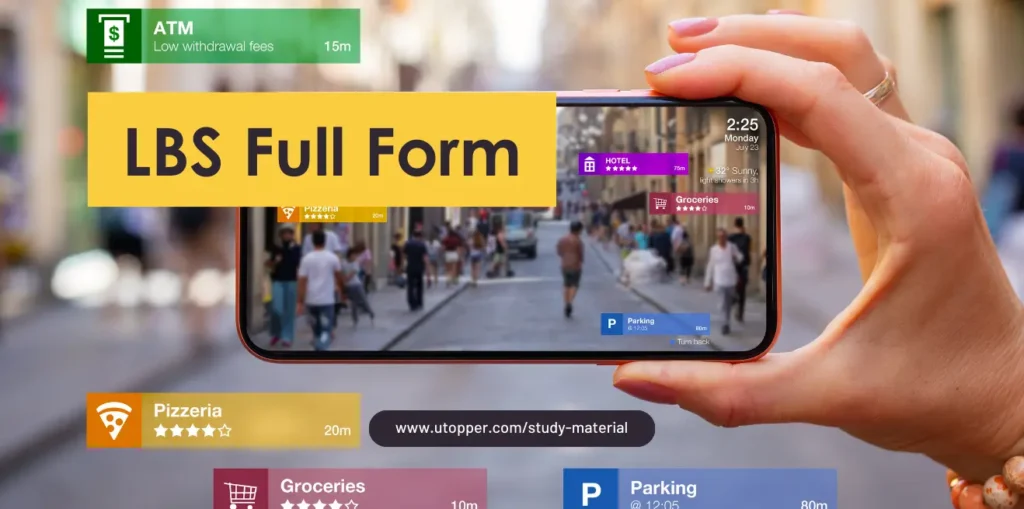LBS FULL FORM: Understanding the Meaning and Importance
LBS FULL FORM – Are you curious about what LBS means and how it can impact your daily life? Look no further, as this article will provide a comprehensive guide on the LBS full form, its meaning, and its importance.
Read Our Other Full Forms

Introduction
In this era of technology, LBS has become an essential part of our daily lives. The world is becoming more connected, and the internet has made it possible to access information from anywhere in the world. With the rise of smartphones and other mobile devices, LBS has become even more important.
What is LBS?
LBS stands for Location-Based Services, which refers to any service that is based on a user’s geographical location. It is a technology that allows mobile devices to determine a user’s location and provide information or services based on that location.
History of LBS
The history of LBS dates back to the early 2000s when the first GPS-enabled mobile phones were introduced. Since then, LBS has evolved and become more sophisticated, thanks to advancements in technology.
Types of LBS
There are four main types of LBS: GPS-based LBS, network-based LBS, hybrid LBS, and context-aware LBS.
GPS-based LBS
GPS-based LBS uses satellites to determine a user’s location. This type of LBS is commonly used for navigation, mapping, and tracking applications.
Network-based LBS
Network-based LBS uses the cellular network to determine a user’s location. It is often used for emergency services and location-based advertising.
Hybrid LBS
Hybrid LBS combines GPS-based and network-based LBS to provide more accurate location information.
Context-aware LBS
Context-aware LBS uses data from a user’s environment, such as weather or traffic conditions, to provide more relevant information or services.
Applications of LBS
LBS has a wide range of applications, including location-based advertising, geotagging, navigation and mapping, and emergency services.
Location-based advertising
Location-based advertising is a type of advertising that targets users based on their location. It is often used by businesses to promote their products or services to people in a specific area.
Geotagging
Geotagging is the process of adding location data, such as latitude and longitude coordinates, to digital media such as photos or videos. This allows users to search for media based on location.
Navigation and Mapping
Navigation and mapping applications use LBS to provide directions and maps to users. This is especially useful when driving in an unfamiliar area or when traveling to a new location.
Emergency services
LBS is used by emergency services to locate people who are in need of help. This can be especially useful in situations where a person is lost or injured and needs assistance.
Advantages of LBS
There are several advantages of LBS, including improved convenience, increased safety, and enhanced customer engagement.
Concerns of LBS
Despite its many benefits, LBS also raises concerns about privacy and security. Users may not be comfortable sharing their location information, and there is always the risk of that information being accessed by unauthorized parties. Additionally, there are concerns about the accuracy and reliability of LBS, particularly in areas with poor network coverage or where GPS signals may be blocked.
Future of LBS
The future of LBS looks bright, with the technology continuing to evolve and become more sophisticated. Advancements in artificial intelligence and machine learning are likely to lead to more personalized and context-aware LBS applications. Additionally, the rise of 5G networks is expected to significantly improve the accuracy and reliability of LBS.
Conclusion
LBS has become an essential part of our daily lives, with applications ranging from navigation and mapping to location-based advertising. While there are concerns about privacy and security, the benefits of LBS are undeniable, and the technology is expected to continue to evolve and improve in the coming years.
Frequently Asked Questions
Q.1 What is the difference between GPS-based LBS and network-based LBS?
GPS-based LBS uses satellites to determine a user’s location, while network-based LBS uses the cellular network.
Q.2 What are some examples of LBS applications?
Examples of LBS applications include navigation and mapping, location-based advertising, and emergency services.
Q.3 How accurate is LBS?
The accuracy of LBS depends on a variety of factors, including network coverage and GPS signal strength.
Q.4 Are there any privacy concerns associated with LBS?
Yes, there are privacy concerns associated with LBS, particularly with regard to the collection and sharing of user location information.
Q.5 What does the future hold for LBS?
The future of LBS looks bright, with advancements in artificial intelligence, machine learning, and 5G networks expected to lead to more personalized and context-aware LBS applications.

